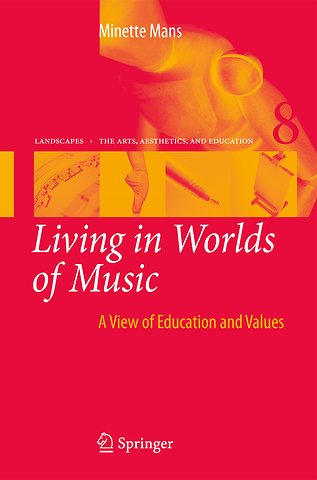Living in Worlds of Music
A View of Education and Values
Samenvatting
Informed by her in-depth ethnomusical knowledge, the result of detailed fieldwork, Mans’s book is about musical worlds and how we as people inhabit them. The book asserts that an understanding of our musical worlds can be a transformative educational tool that could have a significant role to play in multicultural music and arts education. She explores the way in which musical expression, with its myriad cultural variations, reveals much about identity and cultural norms, and shows how particular musical sounds are aesthetically related to these norms. The author goes further to suggest that similar systems can be detected across cultures, while each world remains colored by a distinctive soundscape.
Mans also looks at the way each cultural soundscape is a symbolic manifestation of a society’s collective cognition, sorting musical behavior and sounds into clusters and patterns that fulfill each society’s requirements. She probes the fact that in today’s globalized and mobile world, as people move from one society to another, cross-cultural acts and hybrids result in a number of new aesthetics.
Finally, in addition to three personal narratives by musicians from different continents, the author has invited scholars from diverse specializations and locations to comment on different sections of the book, opening up a critical dialogue with voices from different parts of the globe. Musical categorization, identity, values, aesthetic evaluation, creativity, curriculum, assessment and teacher education are some of the issues tackled in this manner.
Specificaties
Inhoudsopgave
1.1 Theoretical Background
1.1.1 Cultural sensitivities
1.1.2 Music emanates from communities of music practice drawn upon cultural landscapes
1.2 Educational theory principles
Chapter 2 Thinking music: Processes of musical cognition
2.1 Socio-cultural processes of musical thinking
2.1.1 Classifying musical sounds into categories
2.1.2 Recognition, identification, selection, and anticipation
2.1.3 Memory
2.1.4 Development of templates
2.1.5 Cultural immersion and creative thinking
2.1.6 Understanding symbols and value systems
A Musician’s Narrative by Koji Matsonobu
Chapter 3 A functioning musical world
3.1 Social musical organization
3.2 Musical Practice and Behavior
3.3 Musical systems
3.3.1 Macro-organization determined by society and its systems
Counterpoint and interlock by Magne Espeland
3.3.2 Meso-organization into Repertoires
Counterpoint and interlock by Emmanuelle Olivier
3.3.3 Micro-organizatio
Counterpoint and interlock by Trevor Wiggins
3.3.4 Framework with its parameters and rules
Counterpoint and Interlock by Rena Upitis
A Musician’s Narrative by Jackson Kaujeua
Chapter 4 Inhabiting a Musical World
4.1 Identity
4.1.1 Interpretations of cultural and musical identities
Counterpoint and Interlock by Even Ruud
4.2 Normative and aesthetic values invoked by musical worlds
4.2.1 Values and music
4.2.2 Aesthetic evaluations
4.3 Meaning
4.4 Perspectives on musical worlds located in complex cultural-political settings
4.4.1 African metropolitan versus rural worlds by Meki Nzewi (South Africa and Nigeria)
4.4.2 Multicultural Europe by Eva Fock (Denmark)
4.4.3 Modern and traditional Asia by Koji Matsunobu(Japan)
4.4.4 A South American melting pot by Alda Oliveira (Brazil)
4.4.5 Socio-cultural contexts of music education: One North American perspective by Kari Veblen (Canada)
Chapter 5 Educating in living musical worlds *
5.1 The relation of arts education to cultural musical worlds.
5.2 Musical development in classrooms?
5.3 Cultural intersections or collisions?
5.4 Creativity and issues of continuity and change
Counterpoint and interlock by Boh Wah Leung
5.5 Music as social practice and normative education through music
5.6 Suggestions for enhancing musical learning processes within musical worlds
Counterpoint and interlock by Roger Avenstru
5.7 Assessment issues in complex musical worlds
Counterpoint and interlock by Regina Murphy
5.8 Teacher education
A Musician’s Narrative by Eva Sæther
Chapter 6. Concluding thoughts - aluta continua
References
Endnotes
Author biographies
Index
Anderen die dit kochten, kochten ook
Net verschenen
Rubrieken
- aanbestedingsrecht
- aansprakelijkheids- en verzekeringsrecht
- accountancy
- algemeen juridisch
- arbeidsrecht
- bank- en effectenrecht
- bestuursrecht
- bouwrecht
- burgerlijk recht en procesrecht
- europees-internationaal recht
- fiscaal recht
- gezondheidsrecht
- insolventierecht
- intellectuele eigendom en ict-recht
- management
- mens en maatschappij
- milieu- en omgevingsrecht
- notarieel recht
- ondernemingsrecht
- pensioenrecht
- personen- en familierecht
- sociale zekerheidsrecht
- staatsrecht
- strafrecht en criminologie
- vastgoed- en huurrecht
- vreemdelingenrecht






